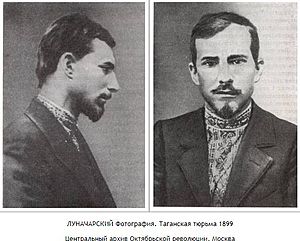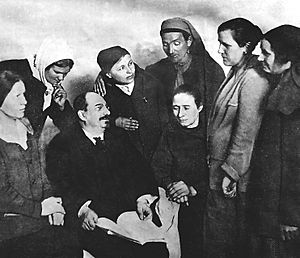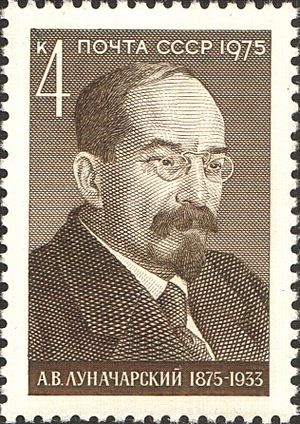Anatoly Lunacharsky facts for kids
Quick facts for kids
Anatoly Lunacharsky
Анато́лий Лунача́рский |
|
|---|---|
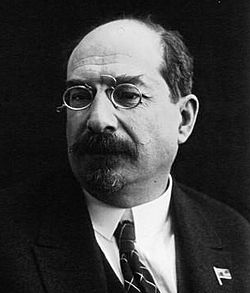
Lunacharsky in 1925
|
|
| People's Commissar for Education | |
| In office 26 October 1917 – September 1929 |
|
| Premier | Vladimir Lenin Alexei Rykov |
| Preceded by | None (position established) |
| Succeeded by | Andrei Bubnov |
| Personal details | |
| Born |
Anatoly Aleksandrovich Antonov
23 November [O.S. 11 November] 1875 Poltava, Russian Empire |
| Died | 26 December 1933 (aged 58) Menton, Alpes-Maritimes, France |
| Political party | RSDLP (Bolsheviks) (1903–1918) Russian Communist Party (1918–1933) |
| Alma mater | University of Zurich |
| Occupation |
|
Anatoly Vasilyevich Lunacharsky (Russian: Анато́лий Васи́льевич Лунача́рский) (born Anatoly Aleksandrovich Antonov, 23 November 1875 – 26 December 1933) was an important Russian figure. He was a Marxist revolutionary and the very first Soviet People's Commissar (which means a government minister) for Education. He was also a talented writer, critic, and journalist.
Contents
Early Life and Education
Anatoly Lunacharsky was born on 23 or 24 November 1875 in Poltava, Ukraine. At that time, Ukraine was part of the Russian Empire. His mother was Alexandra Lunacharskaya. He later took the surname Lunacharsky from his mother's first husband, Vasily Lunacharsky.
When he was 15, in 1890, Lunacharsky became interested in Marxism. This is a way of thinking about society and economics. From 1894, he studied at the University of Zurich for two years. While in Zürich, he met other European socialists. He also joined the Russian Social Democratic Labour Party, a political group.
Becoming a Revolutionary
In 1899, Lunacharsky returned to Russia. He worked with Vladimir Lenin's sister to restart a political group in Moscow. They were arrested but he was later allowed to live in Kyiv. He was arrested again for his political work and sent to prison. After ten months, he was sent to Kaluga. There, he joined a group of Marxists, including Alexander Bogdanov.
In 1902, he was sent to a village in Vologda. He continued his political activities there. In 1903, the Russian Social Democratic Labour Party split into two main groups: the Bolsheviks, led by Vladimir Lenin, and the Mensheviks. Lunacharsky first tried to bring the two sides together. However, he soon joined the Bolsheviks.
In 1904, he moved to Geneva. He became one of Lenin's most active helpers. He also helped edit the first newspaper just for Bolsheviks, called Vpered. People said he was a great speaker. He helped make the Bolsheviks stronger.
Lunacharsky returned to Russia during the 1905 Russian Revolution. He helped publish Bolshevik newspapers and gave talks on art and literature. He was arrested again but soon fled Russia in 1906.
Vpered Group
In 1908, Lunacharsky joined Alexander Bogdanov to start a new group called Vpered. During this time, he wrote books about Marxism and religion. He believed that "god" could be seen as "humanity in the future."
In 1909, Lunacharsky, Bogdanov, and Maxim Gorky started a school for Russian socialist workers in Italy. They taught classes there until 1911. Lunacharsky then moved to Paris. He started his own group focused on working-class culture.
World War I and Revolution
When World War I started in 1914, Lunacharsky was against the war. This view brought him closer to Lenin and Leon Trotsky. After the February Revolution of 1917, Lunacharsky returned to Russia. He joined the Bolsheviks in July–August 1917. He became a very popular speaker for the Bolsheviks. He was arrested with Trotsky in July 1917 but was released in September.
People's Commissar for Education (Narkompros)
After the October Revolution in 1917, Lunacharsky was chosen to lead the People's Commissariat for Education (Narkompros). This was like being the Minister of Education in the new Soviet government. He briefly resigned because of a false rumor about damage to St Basil's Cathedral. However, he returned to his post after two days. After the Soviet Union was formed, he was in charge of education for the Russian Federation.
Lunacharsky did not agree with moving Russia's capital to Moscow in 1918. He stayed in Petrograd (now Saint Petersburg) for a year. His deputy, Mikhail Pokrovsky, managed the department.
Changes in Education
On 10 November 1917, Lunacharsky signed a rule that made school education controlled by the state. He wanted local governments to manage schools. He also ordered that church schools be controlled by local councils.
He faced challenges from teachers. In February 1918, he asked all teachers to report to their local councils and be re-elected for their jobs. He wanted all children to have the same education. He also believed in "polytechnic schools." These schools would teach children a range of basic skills, including practical ones. Specialist training would start later in their teenage years.
In July 1918, he suggested that university teachers should be elected for seven years. He also wanted all university courses to be free. These ideas were strongly opposed by many academics.
Impact on Culture
Lunacharsky was very important in shaping Soviet culture after the Revolution. He supported many new ideas in art.
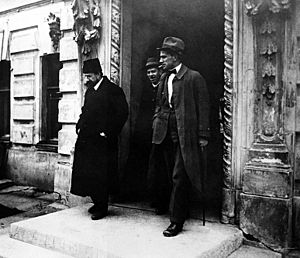
- Art: He supported public art projects like "agit-trains" and "agit-boats." These were trains and boats that traveled around Russia spreading revolutionary ideas and art. He also supported constructivism, a new art movement. He encouraged the creation of revolutionary posters called ROSTA Windows. With his help, 36 new art galleries opened between 1918 and 1921.
- Cinema: He became very interested in cinema, which was a new art form then. He even wrote a short comedy film. Soon after, he made the film industry state-owned. He also started the State Film School. He believed that films could tell the story of humanity.
- Theatre: In the early 1920s, theatre was very important to Lunacharsky. He praised experimental plays. He also wrote his own plays. He helped establish the Bolshoi Drama Theater in 1919. He also convinced the famous Moscow Art Theatre to continue its productions. In 1922, he successfully stopped Lenin's order to close the Bolshoi Ballet.
- Literature: Lunacharsky supported "proletarian" literature, which was literature for the working class. However, he also defended writers who were not experimental or even friendly to the Bolsheviks. He helped writers like Boris Pasternak.
- Music: Lunacharsky was one of the first Bolsheviks to see the talent of composer Sergei Prokofiev. He met Prokofiev in 1918. He helped Prokofiev get a passport to leave Russia. Later, he invited Prokofiev to return to Russia. He greatly admired Prokofiev's music.
In 1929, Lunacharsky supported changing the Russian alphabet from Cyrillic to Latin.
Personality and Influence
Lunacharsky was very influential in setting Soviet policy on culture and education. However, he was not always a powerful political figure. Leon Trotsky described him as someone who was easily influenced by others. He was known for his eloquent speaking.
Ilya Ehrenburg, another writer, said that Lunacharsky had an "extraordinary love of art." Nikolai Sukhanov, who knew him well, said that Lunacharsky had "brilliance of talent" and "no equal in the constellation of Bolshevik leaders" when it came to culture.
Later Career and Death
After Lenin's death, Lunacharsky tried to stay neutral in the political struggles. However, he sometimes caused accidental trouble. For example, he published a book of portraits of revolutionaries but did not include Stalin.
After 1927, he started losing control over cultural policy to Stalin's supporters. In 1929, he was removed from his main office. He was then appointed to the Learned Council of the Soviet Union. He also became an editor for the Literature Encyclopedia.
From 1930 to 1932, Lunacharsky represented the Soviet Union at the League of Nations. In 1933, he was appointed ambassador to Spain. However, he never took up this post.
Death
Lunacharsky died at age 58 on 26 December 1933 in Menton, France. He was traveling to Spain for his new ambassador role when he passed away.
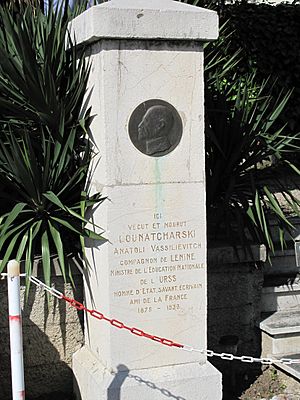
Personal Life
In 1902, Lunacharsky married Anna Alexandrovna Malinovskaya, who was the sister of Alexander Bogdanov. They had a daughter named Irina. Later, in 1922, he married Natalya Rozenel, an actress.
Lunacharsky was known as someone who loved and understood art. He was also interested in philosophy. He could read six modern languages and two ancient ones. He corresponded with famous writers like H. G. Wells and George Bernard Shaw. He also met other important cultural figures like Rabindranath Tagore.
Legacy
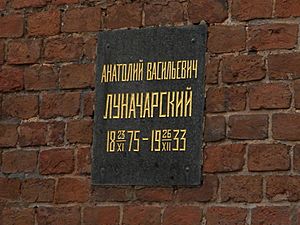
Lunacharsky's remains were brought back to Moscow. His urn was buried in the Kremlin Wall Necropolis. This was a very special honor during the Soviet era. For a time, his name was removed from Communist Party history. However, in the late 1950s and 1960s, his reputation was restored. Many streets and organizations were named after him. People remembered him as an educated, refined, and tolerant Soviet politician.
His daughter, Irina Lunacharsky, helped bring back his popularity in the 1960s.
In 1971, an asteroid was named after Lunacharsky (Asteroid 2446). Some Soviet-built harps also bear his name.
Works
Lunacharsky was a very productive writer. He wrote essays about many authors, including Alexander Pushkin and George Bernard Shaw. His most famous work is his memoirs, Revolutionary Silhouettes. This book shares stories and his thoughts about Lenin, Leon Trotsky, and other revolutionaries.
Some of his other works include:
- Outlines of a Collective Philosophy (1909)
- Self-Education of the Workers: The Cultural Task of the Struggling Proletariat (1918)
- Three Plays (1923)
- Revolutionary Silhouettes (1923)
- Theses on the Problems of Marxist Criticism (1928)
- Vladimir Mayakovsky, Innovator (1931)
- George Bernard Shaw (1931)
- Maxim Gorky (1932)
- On Literature and Art (1965)
See Also
 In Spanish: Anatoli Lunacharski para niños
In Spanish: Anatoli Lunacharski para niños
- God-Building
- New Soviet man
- Working-class culture
- Proletkult
- Proletarian literature
- Proletarian novel


